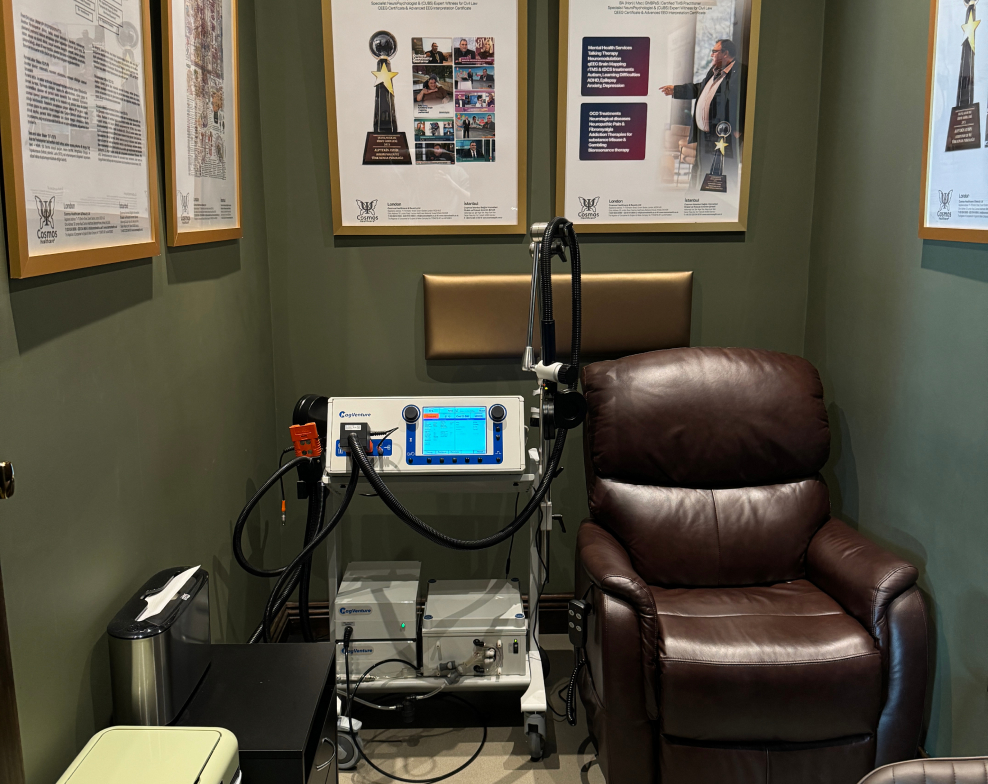

Ongoing Scientific Research, Advancing Neuroscience and Neuromodulation
Scientific progress is at the heart of our mission, and our ongoing clinical and experimental research in neuromodulation, neurodevelopmental disorders, and cognitive enhancement is pushing the boundaries of what is possible in neuroscience. Our ethically approved research studies, conducted under the guidance of Dr. Alptekin Aydin, aim to enhance learning, improve cognitive function, and regulate neural activity using qEEG-guided neuromodulation techniques such as Transcranial Magnetic Stimulation (TMS) and Transcranial Direct Current Stimulation (tDCS).
These research projects have been ethically approved by the Research Ethics Board, ensuring scientific integrity, participant safety, and methodological rigor. The studies focus on understanding how qEEG-guided neuromodulation affects neural connectivity, cognitive abilities, and emotional regulation, particularly in children with neurodevelopmental disorders such as Autism Spectrum Disorder (ASD) and Attention Deficit Hyperactivity Disorder (ADHD).
Current Research Studies and Their Scientific Contributions
Our research explores four key areas in the application of neuromodulation, each with distinct objectives and potential breakthroughs. These studies aim to optimize treatment protocols for ASD, ADHD, anxiety, and cognitive enhancement using personalized brain-mapping technologies.
1. Investigating the Efficacy of qEEG-Guided 1 Hz TMS on Learning & Cognitive Function in Children with ASD & ADHD
This study examines how low-frequency (1 Hz) rTMS applied to the parietal lobe influences sensory perception and cognitive integration in children with ASD and ADHD. Since the parietal lobe is crucial for spatial awareness, sensory processing, and executive function, this research explores:
Whether qEEG-guided neuromodulation can enhance sensory processing, cognitive flexibility, and attention span in neurodivergent children.
How TMS-induced neuroplasticity strengthens learning and problem-solving abilities.
The potential long-term benefits of personalized neuromodulation on academic performance and daily cognitive functioning.
By leveraging qEEG to track brainwave changes before, during, and after TMS treatment, this research offers critical insights into how targeted neuromodulation can improve cognitive function in children with ASD and ADHD.
2. Investigating the Efficacy of qEEG-Guided 10 Hz TMS on Reducing Hyperactivity in Children with ASD & ADHD
Hyperactivity is one of the most challenging aspects of ADHD and ASD, often affecting behavioral control, impulse regulation, and focus. This study explores:
The effect of high-frequency (10 Hz) rTMS on the Right Prefrontal Cortex (rPFC)—a key brain area involved in self-regulation and executive functioning.
Whether qEEG-based targeting of the rPFC leads to reduced impulsivity and improved behavioral control.
The potential for TMS to enhance cognitive-emotional balance, reducing episodes of hyperactivity and frustration.
This study represents a groundbreaking step in using qEEG-guided neuromodulation to regulate excessive neural excitation, offering a non-invasive alternative to pharmacological interventions for ADHD.
3. Investigating the Efficacy of qEEG-Guided tDCS on Reducing Anxiety in Children with ASD & ADHD Generalized Anxiety Disorder (GAD)
Anxiety is a significant comorbidity in children with ASD and ADHD, often leading to social withdrawal, difficulty in academic settings, and heightened emotional dysregulation. This study focuses on:
Applying anodal stimulation over the Left Dorsolateral Prefrontal Cortex (DLPFC) and cathodal stimulation over the Right Supraorbital Cortex to regulate cortical excitability in anxiety-prone individuals.
Measuring the reduction of stress biomarkers and the stabilization of the prefrontal-limbic network following qEEG-guided tDCS.
Comparing baseline and post-treatment qEEG data to assess how neuromodulation alters neural activity associated with excessive worry and emotional hypersensitivity.
This study is pivotal in understanding how home-based, personalized tDCS therapy can serve as an effective intervention for managing anxiety in neurodivergent children.
4. Investigating the Efficacy of qEEG-Guided tDCS on Emotional Regulation and Stress Resilience in ASD & ADHD
Beyond cognitive function, this study explores how tDCS influences stress regulation, emotional reactivity, and long-term adaptation to anxiety-provoking situations. The research investigates:
The impact of personalized tDCS stimulation on autonomic nervous system regulation, particularly in children who experience frequent emotional dysregulation.
How qEEG biomarkers predict and track improvements in emotional resilience following neuromodulation treatment.
The role of neural connectivity in the long-term stabilization of mood and behavior in ASD and ADHD populations.
Through continuous EEG data collection, Neuromap analysis, and AI-driven predictions, this study aims to refine real-time neuromodulation protocols for improving emotional and social functioning.
How Neuromap Supports Scientific Research and Data Analysis
Neuromap plays a critical role in all ongoing research studies, ensuring that treatment effects are accurately monitored and adjusted in real-time. By integrating qEEG, machine learning, and AI-driven predictions, Neuromap enables:
Dynamic treatment personalization, ensuring that each participant’s neuromodulation protocol is optimized for maximum efficacy.
Real-time tracking of brain activity changes, offering immediate insights into cognitive, emotional, and behavioral improvements.
Comparative analysis between baseline and post-treatment qEEG data, providing scientific validation for neuromodulation’s long-term benefits.
Integration of remote home-based neuromodulation solutions, allowing for continuous monitoring and adaptation of treatment protocols outside clinical settings.
Neuromap transforms neuromodulation research from a static process into a fully adaptive system, ensuring that our studies remain at the forefront of precision neuroscience and personalized medicine.
Future Research Directions and Expansion of Neuromodulation Applications
With the success of these studies, we aim to expand our research into additional areas, including:
Post-Stroke Cognitive and Motor Rehabilitation using qEEG-guided TMS and tDCS.
Personalized Neuromodulation for Alzheimer’s and Dementia Treatment, focusing on neuroplasticity enhancement.
qEEG-Guided Brain Stimulation for Treatment-Resistant Depression and Anxiety Disorders, refining targeted therapies for psychiatric conditions.
Neural Adaptation in Athletes and High-Performance Individuals, exploring the role of neuromodulation in enhancing reaction times, focus, and mental endurance.
These future directions will allow us to continue pioneering breakthroughs in neuroscience, bridging the gap between research and real-world applications.
Shaping the Future of Neuroscience with Ethical, Precision-Based Research
Our commitment to scientific integrity, ethical research practices, and real-world impact ensures that our findings contribute meaningfully to the fields of neuromodulation, neurodevelopment, and cognitive health. By combining AI-driven qEEG analysis, real-time brain function monitoring, and dynamic treatment personalization, our ongoing research is redefining how neurological and psychiatric conditions are understood and treated.
With continued innovation and collaboration, our goal is to make personalized neuromodulation therapy a global standard, ensuring that individuals of all ages and backgrounds have access to data-driven, effective, and life-changing brain health solutions.
